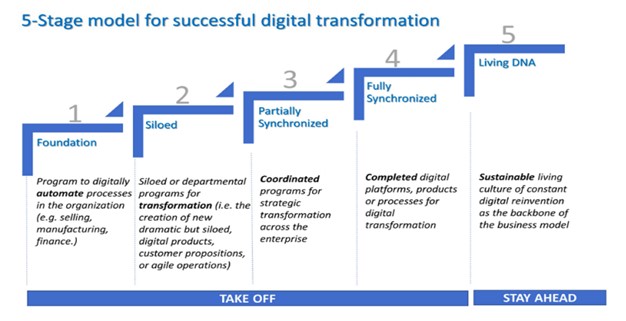of Complex Collaborative Digitalization
Projects and Programs
FEATURED PAPER
Prof. Dr. Brane Semolič
LENS Living Lab, Slovenia
and
By Prof Dr Pieter Steyn
Cranefield College, South Africa
Abstract
Industry 4.0 and the digitalization of business and society remain a main challenge of modern times. New and advanced key technologies enable the introduction of entirely new business models that provide opportunities for better meeting the needs of users, entrepreneurs, investors, business partners, and society. The complexity of emerging business cases requires collaborative partnering by all relevant value chain stakeholders operating in the business ecosystem. The related research, development, and transformation initiatives are done through research innovation and development (RID) projects and programs. There is an urgent need for collaborative RID projects co-organized and performed by teams of value chain business partners. These complex collaborative projects need a holistic approach, organizational synergy, and outstanding leadership to be successful.
Key words: Industry 4.0, complexity, digitalization, collaborative projects and programs, transformation, organizational behaviour, management, leadership.
- Introduction
Mataitsane (2019: Online), refers to the problem where digital transformation is not simply the implementation of ad hoc projects or switching to new technologies such as artificial intelligence (AI), but rather it is an organisation-wide transformation effort to change the business into an agile, data-driven, responsive organization for the clients. Importantly, he points out that bureaucratic silos and a belief that transformation is someone else’s problem are key inhibitors to achieving digitally mature organisations. Figure 1 illustrates the five stages for successful digital transformation an organization should follow for digital transformation to become its living DNA (Saldanha, 2019: Online).

Figure 1: Five stage model for successful digital transformation
(Source: Saldanha, T. 2019: Online)
Akamai (2019: Online) avers that to achieve digital maturity the organization’s operations should be shaped around the correct digital tools. A drive to focus on customer experience delivers the demand for agility and access. The push toward digital maturity can no longer wait if organizations wish to remain sustainable in future. Steyn and Semolic (2018:8), citing Kane (1989), define digital maturity as converting the organization to compete effectively in the increasing digital ecosystem. Maturity exceeds simply implementing new technology by aligning strategy, workforce, culture, technology, and structure with the expectations of the customer, employees, and partners. Digital maturity can thus be seen as an ongoing process of adapting to a changing landscape.
Organizations require an effective digital transformation strategy to remain relevant. Benefits of digital transformation include an improved customer experience, higher productivity, faster time to market for products, brand recognition, higher profitability, and an overall responsive and agile team. Digital transformation in complex collaborative RID project work is critical for increasing the speed of transactions, saving time, and ensuring customer convenience whilst maintaining a higher level of financial security. Moreover, key enabling technologies assist with real-time tracking of transactions and performance monitoring.
At the time of the C19 pandemic breakout, organizations globally found themselves at some level of Industry 4.0 adoption. The following levels can describe digital transformation:
More…
To read entire paper, click here
How to cite this paper: Semolic, B. and Steyn, P. (2023). Management and Leadership of Complex Collaborative Digitalization Projects and Programs; PM World Journal, Vol. XII, Issue IV, April. Available online at https://pmworldjournal.com/wp-content/uploads/2023/04/pmwj128-Apr2023-Semolic-Steyn-management-and-leadership.pdf
About the Authors

Prof Dr Brane Semolič
Founder and Head of LENS Living Lab
International living laboratory
Celje, Slovenia
![]()
Brane Semolič studied mechanical engineering, engineering economics, and informatics; he holds a scientific master’s degree and doctorate in business informatics. His focus of professional interest is industrial and system engineering, innovation and technology management, virtual organizations and systems, project and knowledge management. He has 40 years of working experiences in different industries (industrial engineering, IT, chemicals, household appliances, government, and education), as an expert, researcher, manager, entrepreneur, counselor to the Slovenian government and professor. He operates as head of the open research and innovation organization LENS Living Lab. LENS Living Lab is an international industry-driven virtual living laboratory. He is acting as initiator and coordinator of various research and innovation collaboration platforms, programs and projects for the needs of different industries (ICT, robotics, laser additive manufacturing, logistics, education). He was co-founder and the first director of the TCS – Toolmakers Cluster of Slovenia (EU automotive industry suppliers). Since 2004 he is serving as the president of the TCS council of experts. Besides this, he is operating as a part-time professor at the Cranefield College.
He was head of project and information systems laboratory at the Faculty of Mechanical Engineering, Head of the Project & Technology Management Institute at the Faculty of Logistics, University of Maribor and professor of project and technology management at the graduate and postgraduate level. He acted as a trainer at the International »European Project Manager« post-graduated program, organized jointly by the University of Bremen.
He was the co-founder and president of the Project Management Association of Slovenia (ZPM), vice president of IPMA (International Project Management Association), chairman of the IPMA Research Management Board (2005-2012), and technical vice-chairman of ICEC (International Cost Engineering Council). He actively participated in the development of the IPMA 4-level project managers’ certification program. He introduced and was the first director of the IPMA certification program in Slovenia. He has been serving as the assessor in this certification program since 1997. He performed as assessor in the IPMA International PM Excellence Award Program in China, India, and Slovenia.
Brane is a registered assessor for the accreditation of education programs and education organizations by the EU-Slovenian Quality Assurance Agency for Higher Education. He was a Member of Strategic Advisory Board of European Competitiveness and Innovation, as well as the president of the Slovenian Chamber of Business Services. Brane received the award as ICEC Distinguished International Fellow in 2008. He received the »Silver Sign« for his achievements in research, education, and collaboration with the industry from the University of Maribor in 2015.
Professor Semolič is also an academic advisor for the PM World Journal. He can be contacted at brane.semolic@3-lab.eu. Additional information about the LENS Living Lab can be found at http://www.3-lab.eu/ .
To view other works by Prof Semolic, visit his author showcase in the PM World Library at https://pmworldlibrary.net/authors/brane-semolic/

Prof Dr. Pieter Steyn
Cranefield College
South Africa
![]()
Dr. Pieter Steyn is Founder and Principal of Cranefield College, a South African Council on Higher Education / Department of Education accredited and registered Private Higher Education Institution. Cranefield offers an Advanced Certificate, Advanced Diploma, Batchelor of Business Administration degree, Postgraduate Diploma, Master’s degree (MCom), and PhD. He holds the degrees BSc (Eng), MBA and Doctor of Commerce, and is a registered Professional Engineer.
He was formerly professor in the Department of Management, University of South Africa and Pretoria University Business School. He founded the Production Management Institute of South Africa, and in 1979 pioneered Project Management as a university subject at the post-graduate level at the University of South Africa. Prof Steyn also taught at the Chung-Shan Institute of Science and Technology in Taiwan as a guest lecturer.
He founded consulting engineering firm Steyn and Van Rensburg (SVR). Projects by SVR include First National Bank Head Office (Bank City), Standard Bank Head Office, Mandela Square Shopping Centre (all in Johannesburg), as also, Game City- and The Wheel Shopping Centres (in Durban). He, inter alia, chaired the Commission of Enquiry into the Swaziland Civil Service; and acted as Programme Manager for the Strategic Transformation of the Gauteng Government’s Welfare Department and Corporate Core.
Prof Steyn is a contributing author of the “International Handbook of Production and Operations Management,” (Cassell, London, 1989, ed. Ray Wild) and is the author of many articles and papers on leadership and management. He is a member of the Association of Business Leadership, Industrial Engineering Institute, Engineering Association of South Africa, and Project Management South Africa (PMSA); and a former member of the Research Management Board of IPMA. He serves on the Editorial Board of the PM World Journal. Moreover, he is the owner of the Aan’t Vette Wine Estate and De Doornkraal Vinotel (4-star hotel) in Riversdale, Western Cape.
Prof Steyn can be contacted at cranefield1@cranefield.ac.za. For information about Cranefield College, visit www.cranefield.ac.za.
To view other works by Prof Steyn, visit his author showcase in the PM World Library at https://pmworldlibrary.net/authors/dr-pieter-steyn/









